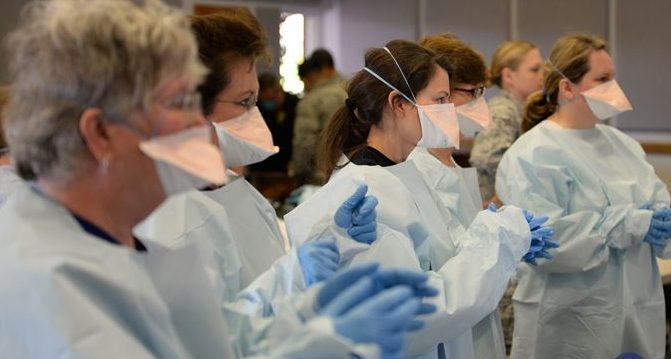-
Eighty-seven percent of respondents are not receiving full quantities of the personal protective equipment (PPE) items they order.
-
N95 face masks are the most urgently needed supply, with nearly a third (30 percent) of respondents reporting no inventory on hand.
-
Problem particularly dire in New York state, where government has ordered senior living employees to wear masks every shift.
-
Urgent need for federal action to ensure facilities can comply with mandates and avoid turning to the grey market for supplies.
Premier Inc. (NASDAQ: PINC), a leading healthcare improvement company, today released survey results finding that more than two-thirds of senior living facilities in the United States cannot obtain the necessary N95 masks, face shields and other personal protective equipment (PPE) that may be needed to care for current or suspected cases of COVID-19.
Healthcare distributors have placed more than 700 unique PPE stock-keeping units (SKUs) on allocation due to COVID-19. Allocation is a process that restricts ordering when demand for a particular product spikes. Allocations are typically set to match the customer’s historic purchase volume in order to protect the supply chain and prevent unnecessary hoarding. A downside of allocation is that, while well intentioned, it may limit healthcare providers in the amounts they can buy, even if they have legitimate reasons for larger orders.
In most hospitals’ and health systems’ facilities, PPE orders are common, as these goods are required to perform a range of activities, including surgeries, ICU care and infection prevention. However, most senior living facilities don’t perform critical care functions, and thus purchase almost no PPE at all. Per Premier data, about 43 percent of the senior living facilities responding to the survey do not have a consistent ordering history for PPE, effectively leaving them without a legitimate channel for purchasing supplies that may be necessary to protect workers and elderly residents in senior living facilities. Of respondents that have a consistent purchasing history of PPE products, 87 percent are not receiving the full quantity of products ordered.
“We’ve already seen a COVID-19 outbreak in a senior living facility in the United States, and now we know this setting is at the greatest risk for shortages,” says John P. Sganga, Senior Vice President of Alternate Site Programs at Premier. “This problem grows more severe by the day, as states such as New York implement requirements for all nursing home employees to wear masks. We urgently need immediate action from the government to prioritize the creation of a controlled and secure distribution channel to get products to these non-acute healthcare providers.
“If we fail to act, these facilities may have no choice but to turn to untrusted sources or the grey market for supplies,” continues Sganga. “That’s a terrible risk, as we already know that grey market scammers are actively trafficking in products that may be counterfeit, stolen, expired, mishandled or adulterated. We can’t gamble with lives like that, especially since senior living facilities care for very frail patients, who are most vulnerable should they contract COVID-19.”
According to the survey, about one-third (30 percent) of senior living respondents reported no inventory of N95 masks, and 68 percent said they had limited to no ability to access additional masks. Nearly 60 percent of respondents also indicated limited to no ability to access gowns. Approximately 65 percent have limited to no ability to obtain disinfecting products such as wipes, spray and hand sanitizer. Nearly 70 percent reported limited to no ability to acquire face shields and other facial protective equipment.
“While our membership is not immune from the shortages of PPE occurring worldwide, Premier is working 24/7 to address our members’ challenges as they occur, including in certain cases working through the traditional channels to free up urgently needed supplies, particularly in the event of a confirmed COVID-19 case in the facility or community,” said Sganga.
To help senior living facilities through a challenging period of limited supply, Premier recommends the following actions:
- Premier urges the government to immediately act upon the President’s Executive Order and begin to exercise its authority to expand the domestic production of PPE using any manufacturing line possible – healthcare and industrial.
- While 76 percent of senior living facilities responding to the survey have implemented the Center for Disease Control and Prevention’s (CDC) guidelines for PPE conservation, Premier encourages all facilities to follow these protocols for the foreseeable future. We believe the government should underscore this imperative.
- Senior living facilities should also implement the CDC’s guidance for infection prevention, including monitoring residents for symptoms, triaging and isolating potential COVID-19 cases. In addition, facilities should also follow guidance from the Centers for Medicare & Medicaid Services (CMS), which recommends cancelling visitation and limiting all communal/group activities.
- Facilities with difficulty obtaining supplies should reach out to Premier for assistance. In certain cases, Premier has been able to work through the traditional channels to free up urgently needed supplies, particularly in the event of a confirmed COVID-19 case in the facility or community.
- Facilities that turn to non-traditional channels to purchase supplies should be extremely cautious, and follow Premier’s guidelines for verifying product authenticity.
To help acute and non-acute members understand the latest state of the supply chain, Premier continues to maintain a members-only disaster response online community, posting daily updates with guidelines and recommendations to best manage and conserve product. Premier also provides the most up-to-date scientific documents, resources and tools needed to manage coronavirus cases through our public-facing Premier Safety Institute.
Survey Methodology
Premier’s survey was conducted from March 6-15, 2020, and sent to a representative portion of non-acute care providers in the Premier membership. Approximately 179 skilled nursing facilities and assisted living facilities with more than 267,000 beds (approximately 10 percent of the total senior living beds in the United States) provided responses. Additional information on backorders and ordering patterns was also collected from national med-surg distribution companies, as well as Premier’s own purchasing data.

